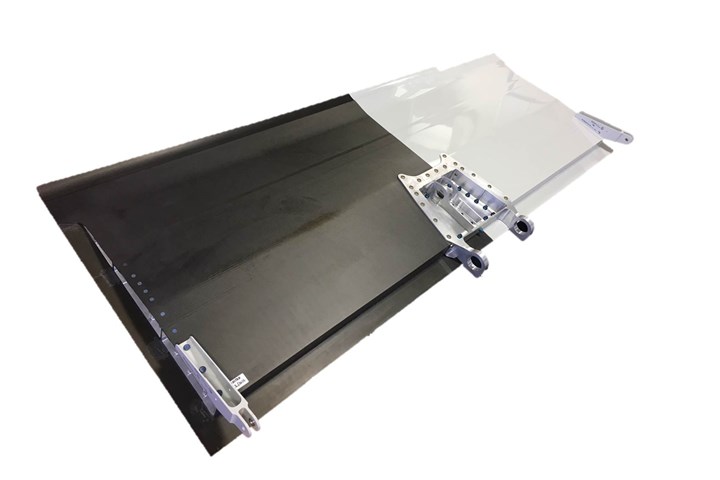Teijin Ltd. Tenax carbon fiber qualified for Airbus A320neo
Tenax dry reinforcements non-crimp fabrics and braided fibers will form the skins and stiffeners via automated RTM.

A320neo spoiler. Source | Teijin
Teijin Ltd. (Tokyo, Japan) announced on July 21 that it has qualified its Tenax dry reinforcements (DR) carbon fiber materials for the Airbus A320neo wing spoilers using an automated resin transfer molding (RTM) process developed by Spirit AeroSystems (Wichita, Kan., U.S.), a leading manufacturer of aircraft structural components. More specifically, Teijin’s Tenax dry reinforcements non-crimp fabrics (DRNF) and Tenax braided fibers (DRBF) are being incorporated to form skins and stiffeners while maintaining existing product interfaces, enabling direct replacement of the final spoiler components.
Teijin Ltd notes that Tenax DRNF and Tenax DRBF have been developed for resin infusion RTM processes which can offer higher productivity and component integration than conventional autoclave molding. The company says its Tenax DRNF materials are made of bundled carbon fiber filaments spread out in one direction in multiple layers with different directions, depending on the final component’s structural requirements. The fabric is said to have excellent fiber orientation, resulting in better mechanical properties than conventional woven fabric and reaches properties equivalent to aerospace grade thermosetting unidirectional prepreg. Alternatively, Tenax DRBF materials are applied within the spoiler component structure to act as cavity fillers and have been qualified individually by Airbus specifically for this application.
Teijin says the combination of the Tenax DRNF and Tenax DRBF achieves the Spirit AeroSystems criteria for aircraft component production, including effective process ability, productivity and cost efficiency. A320neo spoiler components will be manufactured within a new high-volume production facility in Spirit AeroSystems’ Prestwick facility (read “High-rated automated aerospace RTM line delivers next-gen spoilers”).
Teijin says it is intensively accelerating its development of mid- to downstream applications for aircraft, such as cost-effective carbon fibers with higher-tenacity and higher-tensile modulus, intermediate materials including Tenax DR carbon fiber materials, carbon fiber thermoplastic unidirectional pre-impregnated tape (Tenax TPUD), carbon fiber thermoplastic consolidated laminate (Tenax TPCL) and thermoset prepreg. Going forward, Teijin says it intends to further strengthen its carbon fiber and its intermediate material business as a leading solution provider for aircraft applications, targeting annual sales in this field in excess of $900 million by around 2030.
Related Content
-
Low-cost, efficient CFRP anisogrid lattice structures
CIRA uses patented parallel winding, dry fiber, silicone tooling and resin infusion to cut labor for lightweight, heavily loaded space applications.
-
Plant tour: Collins Aerospace, Riverside, Calif., U.S. and Almere, Netherlands
Composite Tier 1’s long history, acquisition of stamped parts pioneer Dutch Thermoplastic Components, advances roadmap for growth in thermoplastic composite parts.
-
Plant tour: Aernnova Composites, Toledo and Illescas, Spain
RTM and ATL/AFP high-rate production sites feature this composites and engineering leader’s continued push for excellence and innovation for future airframes.






